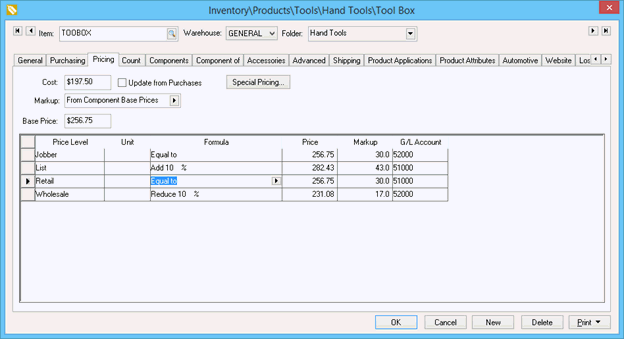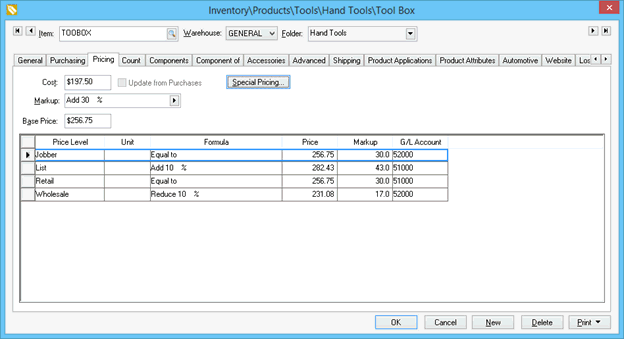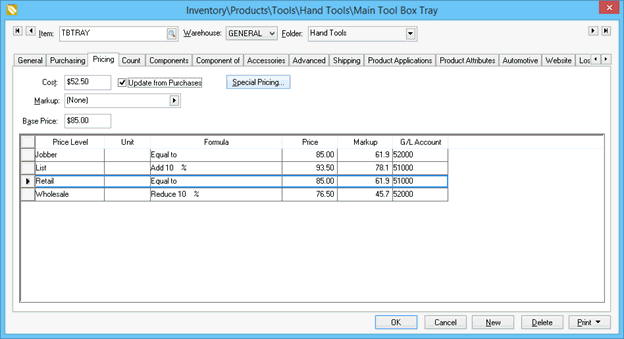- EBMS Knowledge Base
- Inventory
- Components (BOM) and Accessories
-
Client Resources
-
EBMS Main Documentation
- Introduction
- Getting Started
- Getting Started | Initial Installation
- Getting Started | Company Setup
- Quick User Guide | Financial Staff | Accountant
- Quick User Guide | Financial Staff | Accountant | Accountants Journal
- Quick User Guide | Sales Staff
- Quick User Guide | General Staff
- Features
- Reports
- Security
- Server Manager
- Technical
- Technical | Data Import and Export Utility
- Technical | SQL Mirror
- Automotive
- Automotive | Parts Catalog
- Automotive | Pricing
- Automotive | Point of Sale
- Automotive | Product Application
- Automotive | Keystone Interface
- Metal Supply
- Fuel Sales
- Horticulture
- Horticulture | Farm Setup
- Horticulture | Processing Payroll
- Horticulture | Managing the Farm
-
Sales
- Introduction
- Customers
- Customers | Miscellaneous Customers
- Proposals
- Proposals | Processing Proposals
- Proposals | Sets and Templates
- MyProposals
- MyOrders
- Sales Orders
- Invoices
- Materials Lists
- Sales and Use Tax
- Sales and Use Tax | TaxJar
- CRM
- CRM | Auto Send
- Recurring Billing
- Credits
- Customer Payments
- Payment Card Processing
- Payment Card Processing | Gift Cards
- Payment Card Processing | Loyalty Cards
- Payment Card Processing | Verifone Gateway
- Freight and Shipping Tools
- General Ledger Transactions
- Point of Sale
- Point of Sale | Point of Sale Hardware
- Point of Sale | Xpress POS System
- Point of Sale | Advanced Tools
- Signature Capture
- Salesperson Commissions
-
Inventory
- Product Catalog
- Product Catalog | Using Product Codes for No Count Items
- Product Pricing
- Product Pricing | Special Pricing
- Tracking Counts
- Unit of Measure
- Purchasing
- Special Orders and Drop Shipped Items
- Receiving Product
- Barcodes
- MyInventory and Scanner
- Components (BOM) and Accessories
- Components (BOM) and Accessories | Component Formula Tool
- Made-to-Order Kitting
- Configure-to-Order Kitting
- Multiple Inventory Locations
- Multiple Inventory Locations | Creating Locations
- Multiple Inventory Locations | Using Multiple Locations
- Multiple Inventory Locations | Product Catalog Sync
- Multi-Vendor Catalog
- Serialized Items
- Serialized Items | Purchasing or Manufacturing an Item
- Serialized Items | Selling and/or Associating an item with a customer
- Lots
- Product Attributes
- Product Attributes | Selling and Purchasing Items with Attributes
- Product Attributes | Custom Attributes
- Mobile Scanner (Legacy)
-
Labor
- Getting Started
- Workers
- Taxes and Deductions
- Work Codes
- Time and Attendance
- Time and Attendance | Time Track App
- Processing Payroll
- Closing the Payroll Year
- Processing Payroll - Advanced
- Salaried Pay
- Piecework Pay
- Direct Deposit
- 3rd Party Payroll Service
- Subcontract Workers
- Flag Pay
- Prevailing Wages
- MyDispatch
- MyTasks
- MyTime
- MyTime | Communications
- MyTime | Setup
- Tasks
- Tasks | Getting Started
- Tasks | Creating Tasks
- Tasks | Scheduling Tasks
- Tasks | Customizing Task Views
- Tasks | Managing Tasks
-
Financials
- Introduction
- Fiscal Year
- Chart of Accounts
- Budget
- Financial Reporting
- Transactions and Journals
- Transactions and Journals | Journals
- Account Reconciliation
- 1099
- Departments and Profit Centers
- Fund Accounts
- Bank Accounts
- Bank Feed
- Vendors
- Vendors | Miscellaneous Vendors
- Purchase Orders
- Expense Invoices
- Vendor Payments
- AP Transactions
- Landed Cost
- Fixed Assets and Depreciation
- Fixed Assets and Depreciation | Fixed Assets
- Fixed Assets and Depreciation | Fixed Assets | Adding Assets
- Fixed Assets and Depreciation | Processing Depreciation
- Fixed Assets and Depreciation | Disposing Assets
- MyJobs
-
E-commerce
-
Rental
-
Job Costing
-
Manufacturing
Option and Kit Pricing
Option and Kit Pricing allows the user to adjust the price based on the optional components that are selected. This flexible pricing module can be used within EBMS in the following processes:
- Assemblies and Kits: Items may be priced based on the optional components created within an assembly. Review the Materials Lists > Entering Inventory Components to the Materials List section of the Sales documentation for more details.
- Made-to-Order Items: Items may be priced based on the optional components within a MTO item. Review the Made-to-Order Kitting > Inserting a MTO Item into a Sales Order section for more details on the pricing options within a MTO manufacturing match.
- Configure-To-Order Items: Items may be priced on the optional components of a CTO item. Review the Configure-To-Order Kitting > Overview of the CTO Process section for more details on configuring a CTO item.
An inventory item with optional components can be priced using one of the following three methods. Two options have variable pricing and the 3rd is fixed pricing.
-
Total base price of components
-
Total cost of components
-
Fixed Price of Kit
Total Base Price of Components
The price is determined by the total of the base price of each selected component: The base price for each selected component is totaled and copied to the Base Price entry within the Pricing tab of the assembly as shown below:
Select the From Component Base Prices option from the Markup/Margin option list. The Base Price will total the base prices of each default component listed in the Component tab. The prices will change if an optional component is selected that contains a base price that is not equal to the base price of the default item.
The pricing may be rounded as shown in the example above. The Retail price does not equal exactly to the Base Price since the retail price is being changed by the rounding algorithm. Review the Pricing > Rounding Calculated Prices section for more details on rounding options.
This option should always be used for Configure-To-Order (CTO) items. Review the Configure-To-Order Overview section for more details on configuring CTO items.
Total Cost of Components
The price is determined by the total cost of all the components selected: The total cost of all the components listed in the Component tab is copied to the Cost entry within the Pricing tab. The cost total includes the cost of the default optional component. The Markup/Margin option should be set appropriately so the Base Price is derived from the Cost value as shown below:
The assembly price will vary based on the cost of the optional component selected at the time of the sale. In the example above, the retail price will equal 40% above the cost of all the selected components.
The Assembly Kit option must be enabled within the Components tab for this option to function properly.
Fixed Price of Kit
The assembly price is fixed and is not affected by the options selected within the item. This is the standard pricing used for items without optional components. This option should be used to fix the price no matter what options are selected from the components tab. To accomplish a fixed place, go to Inventory > Product Catalog > Pricing and set the Markup/Margin option to (None) as shown below: 
The Base Price value should be set to the desired price. It must be manually changed since the Base Price is not automatically calculated from any other value.
Review the Pricing > Inventory Pricing Overview section for more details on pricing formulas and configuration.
